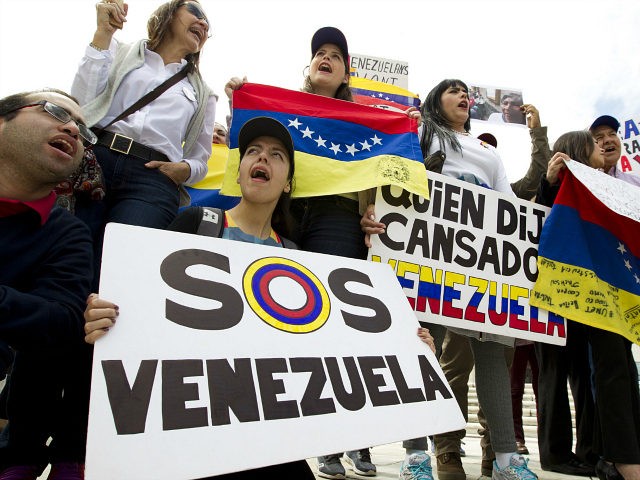Socialist dictator Nicolás Maduro deployed the military to block a convoy of U.S.-backed humanitarian aid from entering Venezuela on Tuesday, leaving much-needed food and medical supplies stuck on a border bridge in Colombia.
Venezuela’s legitimate president, Juan Guaidó, made his first act as president two weeks ago to request humanitarian aid for his country, reeling from a crisis caused by two decades of socialist rule. The United States, which no longer recognizes Maduro as the head of Venezuela’s government, responded by promising a $20-million aid shipment to be sent through Colombia.
That shipment arrived in Cúcuta, a Colombian town that shares a border with Táchira state, Venezuela, this week. Yet shortly before trucks prepared to cross the bridge into Táchira, Venezuelan soldiers shut down the bridge, keeping the food from entering the country.
Representatives of the opposition-led National Assembly deployed to the border to welcome the shipment told Agence France-Presse (AFP) that soldiers placed a large gasoline transport trailer and a train boxcar perpendicular to the Tienditas bridge, blocking all traffic into Venezuela. An eyewitness told the French news agency that at least three people were injured on the Venezuelan side of the bridge in a “confusing” situation in which the military arrived and began to set up the blockade, running over cyclists.
The Colombian-American coalition attempting to deliver goods to Venezuela reportedly chose to use the Tienditas bridge, the construction of which was never completed, to deliver goods as it has become a common crossing point for Venezuelans to enter Cúcuta and gain access to its markets. Venezuela stopped constructing the bridge in 2016 as the lack of food and medicine in the country led tens of thousands of Venezuelans to attempt to enter Colombia every weekend to buy goods, producing embarrassing images for a regime that continues to deny the existence of any humanitarian crisis.
U.S. Secretary of State Mike Pompeo posted a photo of the trailers blocking the path connecting the two nations on Twitter, condemning the Maduro regime for refusing to allow food to reach his starving population.
“The Venezuelan people desperately need humanitarian aid,” Pompeo argued. “The Maduro regime must LET THE AID REACH THE STARVING PEOPLE.”
Pompeo personally announced the shipment of food and other aid to Venezuela during an emergency meeting of the Organization of American States (OAS) last month following Guaidó’s inauguration and request for food.
“These funds are to help them cope with the severe food and medicine shortages and other dire impacts of their country’s political and economic crisis,” Pompeo announced, explaining that the United States responded to Guaidó’s request and ignored Maduro because, constitutionally, only Gauidó has the power to request aid. By the next week, $20 million worth of aid arrived in Colombia, ready for shipment to Venezuela.
Maduro delivered an aggressive speech shortly after the package’s arrival insisting that his military would prevent any food from getting to the Venezuelan people because the aid was a pretext to invade Venezuela.
“Nobody is going to enter Venezuela, not even a single invading soldier. We do not fear the threats of the American empire,” he said. “We tell Donald Trump as a people of peace that we do not fear him at all.”
For the past three years, the Venezuelan military has had control of the nation’s food supply, which Maduro mandated claiming it necessary to protect from black market sales and looting. Nearly all of Venezuela’s food supply is imported, as Maduro and predecessor Hugo Chávez nationalized most of the country’s farmlands and food corporations, placing socialist cronies in leadership positions despite a complete lack of experience in agriculture.
Multiple reports shortly after the order to give the military full control over food confirmed that soldiers used their power to bribe starving Venezuelans for access to the food, sometimes selling it at 100 times the official price mandated by the socialist government. A 2017 report found that, when Venezuelans ran out of money to pay the bribes, the soldiers began allowing entire ships full of food to rot in ports instead of distributing it or selling it at the legal price.
Guaidó and the National Assembly have begun operations to help bring American food into the country. The National Assembly sent a team of representatives to the Colombian border to find alternatives to transporting the aid through the closed bridge. The team has launched a campaign to encourage the soldiers tasked with keeping the aid from the Venezuelan people to revolt and no longer pledge allegiance to Maduro as he is no longer legally the president of the country.
“You must make a clear decision: either you are on the side of the indolence, or you can help the people who have needs … this is a golden opportunity to show Venezuelans that soldiers are on the side of solutions and no longer accomplices [of the regime],” lawmaker Miguel Pizarro, from the team sent to the border, said.

COMMENTS
Please let us know if you're having issues with commenting.